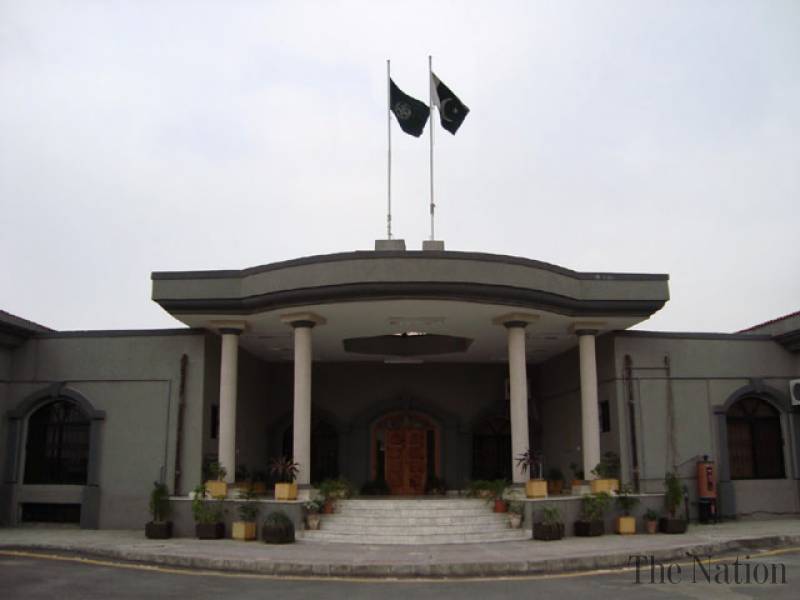islamabad - The Islamabad High Court yesterday served pre-admission notices on respondents, including Defence Minister Khawaja Asif, in a petition of Pakistan Tehrik-i-Insaf leader Dr Shireen Mazari who moved an intra-court appeal seeking nullification of the IHC single bench’s verdict that had rejected her petition against the minister who had used insulting language against her.
The IHC Division Bench (DB) comprising Justice Shaukat Aziz Siddiqui and Justice Mohsin Akhtar Kayani issued the notices and directed the parties to argue on the maintainability of the this mater on the next hearing.
After issuing the abovementioned directions, the IHC dual bench deferred the hearing till November 21 for further proceedings.
Mazari moved the court through her counsel Shoaib Razzaq Advocate and cited Federal Minister for Law & Justice Zahid Hamid, Federal Minister for Defence and Water & Power Khawaja Asif, Speaker National Assembly Ayaz Sadiq and Federal Minister for Parliamentary Affairs Sheikh Aftab Ahmed as respondents.
Shireen requested the court to reinterpret Article 69 of the Constitution that imposes a bar on constitutional courts to question about validity of the parliamentary proceedings.
She continued that the said interpretation of the Article 69 is inconsistent with the issues related to fundamental rights, defamation and laws against harassment of women at work place.
It was October 5 when an IHC bench had turned down her petition by terming it as non-maintainable while observing that Article 69 of the Constitution bars the courts to inquire into the proceedings of the Majlis-e-Shoora (parliament).
In her intra-court appeal, she has alleged that on June 8, 2016 during a scheduled National Assembly session PML-N Federal Minister Khawaja Asif made derogatory, defamatory, unwarranted and ill-founded remarks against her, which were a testament of a libertine.
The petitioner mentioned that Khawaja Asif while addressing to the Speaker made following remarks on her, firstly by saying “ae tractor trolley nou we chup karwaoo zara” (order this tractor trolley to shut her mouth).
Secondly “ghar in sae sambhalay nai jatae” (that she cannot manage her family implying that she cannot manage her private affairs, so how is she capable to talk and represent on behalf of the people of her constituency). And thirdly “make her voice more feminine.”
She adopted that the aforesaid comments were wholly discriminatory and bigoted because the appellant was specifically singled out on basis of her gender and it was a malicious attempt to disparage her well-earned reputation in front of her fellow Parliamentarians and the public at large.
In her intra-court appeal, Dr Mazari contended that the main purpose of the parliamentary privilege is to enable the parliamentarians to go about its business without interference from outside.
She argued that the remarks made by Khawaja Asif are criminal in nature and are dealt under Pakistan Penal Code 1860, as he has defamed the appellant which comes under section 500, has intentionally insulted the petitioner with an intent to provoke breach of peace which comes under section 504, has acted to insult the modesty of a women which comes under section 509 and has verbally harassed her which created a hostile working environment for her and thus comes under the protection against harassment of women at the workplace act 2010.
“That there are numerous jurisdictions where such a conduct is held accountable, prominently in Turkey where parliamentary immunity was removed in May 2016.
In Ukraine it has been held that the Peoples Deputies of Ukraine are immune to what they say and how they vote in the Parliament, except the responsibility for an insult or defamation.
But most prominently the Head of European Union, Germany, has categorically embedded in their constitution under article 46 that the Deputy shall not be exempted from defamatory insults,” maintained the petitioner.
She added that the Superior Court has categorically mentioned in its judgments when the Fundamental Rights of the citizens are infringed that the Constitutional Courts have to interfere in order to safeguard the rights which are guaranteed in the Constitution.
Therefore, Dr Mazari prayed to the court to set aside single bench order, reinterpret the provisions of article 69 to safeguard the rights of female members and declare interpretation of the said article inconsistent with fundamental rights and Islamic jurisprudence.






